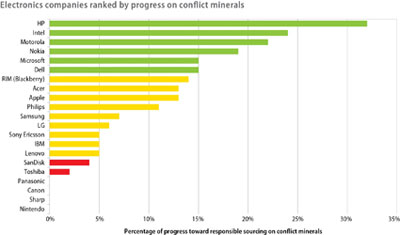
Violent conflict and mass atrocities continue to persist in eastern Congo as myriad armed groups, including the Congolese national army, battle for control over natural resource reserves and prey off local populations. This ongoing war is exacerbating regional instability, giving rise to some of the most heinous violence and sexual abuse in human history, and displacing hundreds of thousands of innocent civilians. The primary resources sought by these groups are also critical components to the electronic devices that millions of Americans, Canadians, and Europeans will purchase and receive this holiday season. The connection between consumer electronic products and violent conflict in Congo has been recognized by governments, companies, and human rights advocates around the world, and there is consensus that by creating an international system for conflict-free minerals certification, similar to the Kimberly Process for blood diamonds, these groups can help to reduce violent conflict in Congo and choke off the indirect funding of armed groups perpetuating this unnecessary conflict.
In a report released today, my colleagues and I from the Enough Project respond to the growing consumer demand for electronics free of the conflict minerals that fuel ongoing war in eastern Congo. Our report “Getting to Conflict Free: Assessing Corporate Action on Conflict Minerals,” ranks electronics companies on their progress toward responsible supply chain management and constructive engagement in the burgeoning conflict-free certification process.
The primary minerals extracted from eastern Congo—the ores that produce tin, tantalum, tungsten, or the 3Ts, and gold—are essential to the electronics devices we use and depend on every day. These minerals are central to the technologies that have allowed our culture to thrive and that drive our businesses, our communications infrastructure, our social engagement, and our national security. Two years ago we began engaging with electronics industry leaders in order to call their attention to the issue of conflict minerals and inquire about the steps they were taking to ensure their products were conflict-free. The objective was to have companies at the top of the minerals supply chain use their buying power to influence their suppliers, exerting pressure down the supply chain—a model of change that has had success in the apparel, forestry, and diamond sectors. Since then, there have been dramatic changes, including the passage of conflict minerals legislation in the United States, and an evolving multilateral framework for international supply chain due diligence from the United Nations and Organization of Economic Cooperation and Development, or OECD. We have also seen a host of efforts initiated by Congolese and international companies, governments, and NGOs to trace supply chains back to their sources, independently audit chains-of-custody, and conceptualize certification schemes.
Despite this progress, there is still a long road ahead. Although it will take a collective effort by multiple industries to curtail the demand for conflict minerals, the impetus for such efforts will continue to arise in large part from conscious consumers. These rankings are an effort to provide consumers with the information they need to purchase responsibly and to encourage companies to continue to move forward in good faith. We are hopeful that as the rankings are updated in subsequent reports, and as the process for tracing, auditing, and conflict-free certification develops, scores and methodology will improve.
To view the report, click here.
To consult our consumer guide and encourage electronics companies to go conflict-free, click here.

